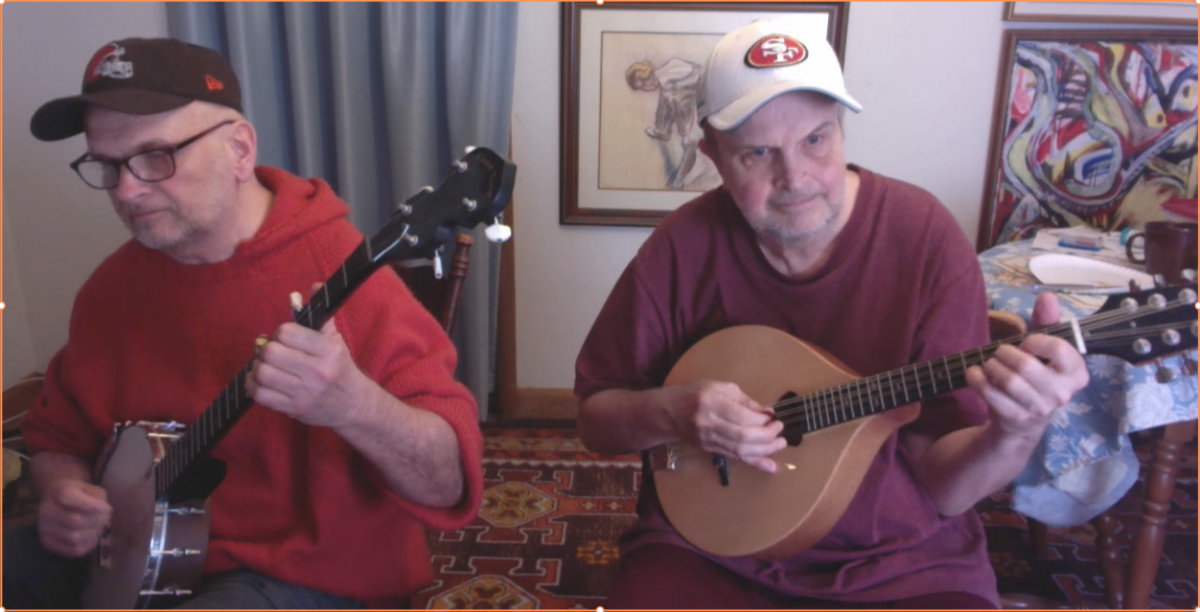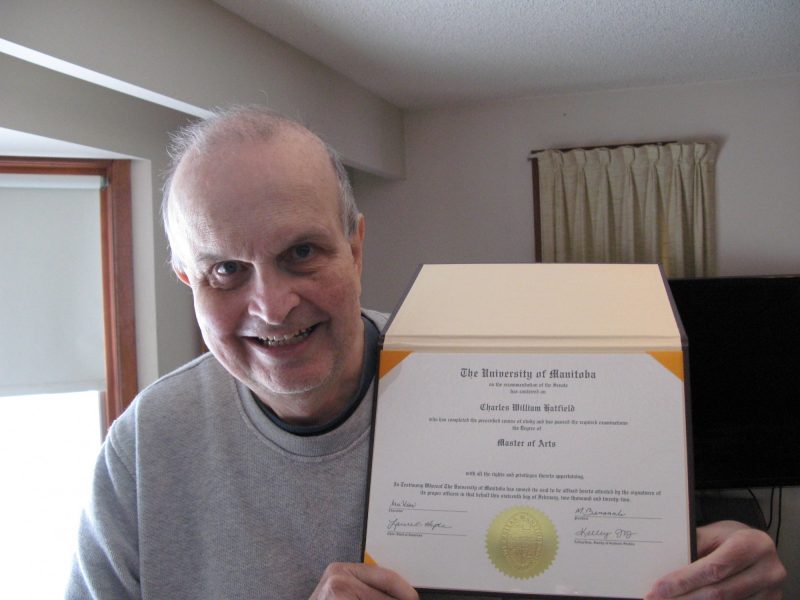
John Hatfield (left) and brother Charles (right) now have another hobby in common after playing music: taking German classes at UM together.
Age and curiosity inspire a new love of learning
Charles and John Hatfield feel 'young again' after returning to university in their 60s
Nobel Prize winning physicist Rosalyn Yalow once famously posited that “the excitement of learning separates youth from old age.”
2022 graduating student Charles Hatfield and current student John Hatfield would certainly agree. Charles, 72, and his brother John, 67, began their education journey over four decades ago, when Charles enrolled at the University of Manitoba, majoring in physical education with a minor in mathematics.
“As a kid, I wanted to play for the Blue Bombers in high school,” Charles says. “I thought physical education would allow me to do something athletic with my career, but after three years I realized my strength was my brain and not my body.”
After graduation, Charles applied for a position teaching mathematics at Shaftsbury High School. He was a beloved teacher and taught there until his retirement. John, a fellow sports fan, had the same idea as his brother, but inevitably came to the same conclusion.
“I went into physical education, and I found, the same as [Charles] did, that as athletes go, I was very ordinary,” he explains.
John applied for a position as a library assistant at UM’s Elizabeth Dafoe Library, where he worked for 40 years.
“I wasn’t very suited to being a teacher, so when I did get an opportunity to just get into the library as a regular office worker, I took that and I much preferred that kind of life,” says John. “I thought it was just a super job, because the campus is a great environment to be, among young people, and the whole atmosphere in the library.”
A linguistic revelation
While Charles retired after 25 years, John enjoyed his time working at the library so much that he never considered retirement. But when their mother died, John had a revelation.
“Our mother was born in Germany, she lived there until she was seven years old and then she moved to Canada. She spoke German to both of us,” Charles says. “About a year after she died, John said ‘if we don’t take a German course of some kind, we’re going to lose our language’ because we don’t speak it to each other, we speak English.”
The fear of losing their language prompted Charles, after a career of teaching, to wade back into the waters of student life.
“I was only going to take just the first-year German course, just to brush up on my grammar, and that was it,” Charles explains. “I was happy to be retired.”
Charles previously hated English or literature courses in high school and was ‘thrilled’ when he graduated, thinking he wouldn’t take any such courses again. But the single German grammar course sparked an infatuation with literature and language that Charles never could have predicted.
“I took the course, and just had a fantastic professor and I loved the rules!” Charles says. “Germans have rules for grammar, and it was close to mathematics, and I loved it. I took as many grammar courses as I could, and I ran out of grammar courses.I would take one course a year, or two half courses – one every semester, and just kept filling in with whatever I could, and it turns out most of them were literature courses, and suddenly, I liked literature too.”
As a high school math teacher, Charles looked down on language and literature courses, feeling they were not as “important” as mathematics. Now his feelings are different.
“My mind has completely changed,” Charles says. “My German literature professors are all brilliant. They’re the smartest people I know.”
Like a seasonal flu, Charles’ new love of German literature eventually spread to his roommate, John. Filling his time with his university studies has made the transition to retirement a pleasant one.
“I felt that I had to retire for my health’s sake, but it turned out to be a good thing, because I’ve loved it ever since I finished work,” John says. “Things are even better.”
The new kids in class
Charles and John both say the transition back to school could not have been better, due in no small part to their connection with fellow students who, despite the large gap in age and experience, welcomed and engaged with them as though they were peers.
“In the one class, we didn’t even sit together because I like to sit in the front of the room, and [John] likes to sit in the back,” Charles explains. “He was sitting in the back with his own friends who were 19- and 20-years-old and I was sitting with my group of 19 and 20-year-old friends at the front. They’re young enough to be my grandkids and they’re talking to me like I’m one of the bunch. It just made me feel so much younger, sitting with these kids who accepted me.”

Charles Hatfield with his master’s degree parchment.
Selma Osmanovic, a classmate of Charles and John, says that the feeling was mutual, and that the brothers’ patient and open presence in class was invaluable to her and other classmates’ learning experience.
“He brought so much wisdom to our classes and our casual discussions,” Selma says of Charles. “It became very easily noticed when he was not present to add his thoughts.”
Charles will be graduating this June with a masters degree in German and Slavic studies. His thesis, which focuses on the depiction of Indigenous women in German literature of the 19th century, is nominated for the German Studies Canada Prize for the Best MA Thesis. He says his thesis was inspired by his professor, Dr. Alexandra Heberger, who went above and beyond to support him, even ordering books from Germany for them to discuss together. The additional support from his professor was invaluable in helping illuminate the text for him, while challenging some of his own biases and perspectives.
“Here’s this professor, reading, I don’t know, 14 or 15 new books, just so she can discuss them with one student!” explains Charles. “We got to have these great talks on how this [book] is more stereotyped than the others and what are the good parts. To really criticize them, you must not think Eurocentrically. I’m a Eurocentric thinker, I can’t help it, but I can now catch myself thinking Eurocentrically and can be critical of it.”
While Charles and John say their “overwhelmingly positive” experience at UM helped expand their intellectual horizons, their eager participation in class also left a lasting impact on their professors and classmates.
“Our discussions reminded me of why I fell in love with my job and research in the first place and gave me a new focus for my personal research as well,” says his professor Dr. Heberger, who supervised Charles’ thesis. “It was such a pleasure working with Charles because there was always a level of joy, curiosity and great enthusiasm added to all his academic work. Charles’ writing and all his presentations in class were inspiring. I am very grateful that Charles and John are part of my journey.”






